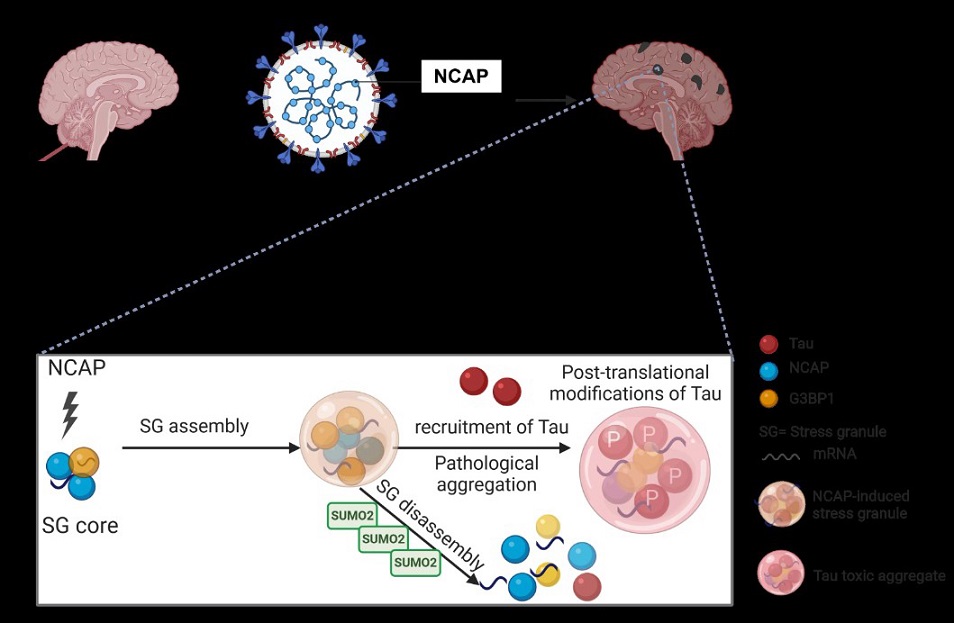SARS-CoV-2 Nucleocapsid Protein Triggers Tau Changes Which Can Be Mitigated By SUMO2
Nikhil Prasad Fact checked by:Thailand Medical News Team Jun 29, 2024 1 year, 7 months, 2 days, 11 hours, 33 minutes ago
COVID-19 News: The world has been grappling with the respiratory effects of COVID-19, but recent research shows its impact on the brain might be just as alarming. This
COVID-19 News report covers a new study by researchers from
Columbia University, New York-USA, University of Toronto-Canada and Istituto di Ricerche Farmacologiche Mario Negri IRCCS-Italy that delves into the surprising connections between COVID-19 and brain health, highlighting the role of Tau proteins and the potential of SUMO2 to mitigate these effects.
 Nucleocapsid Proteins From SARS-CoV-2 Induces Pathological Changes Of Tau In The Hippocampus
The Hidden Neurological Impact of COVID-19
Nucleocapsid Proteins From SARS-CoV-2 Induces Pathological Changes Of Tau In The Hippocampus
The Hidden Neurological Impact of COVID-19
When COVID-19 first emerged, its primary threat was thought to be respiratory distress. However, as the pandemic unfolded, many patients reported neurological symptoms. These included loss of smell and taste, persistent fatigue, headaches, and "brain fog" - a term used to describe difficulty concentrating and memory issues. These observations led scientists to investigate the virus's impact on the brain more closely.
The Crucial Role of Tau Proteins
Tau proteins are essential for maintaining neuron stability in the brain. Abnormal behavior of these proteins is a hallmark of Alzheimer's disease and other neurodegenerative conditions. Recent studies have shown that COVID-19 patients with neurological symptoms often have elevated levels of Tau proteins, indicating potential brain injury.
How COVID-19 Affects the Brain
The SARS-CoV-2 virus, which causes COVID-19, may trigger neurological symptoms through its nucleocapsid protein (NCAP). This protein is crucial for the virus's replication and spread. Research suggests that NCAP interacts with Tau proteins, leading to their abnormal behavior. This interaction could explain the cognitive decline seen in some COVID-19 patients.
Stress Granules and Their Role in Neuronal Damage
A key discovery involves stress granules (SGs), which are cellular structures that form in response to stress, including viral infections. SGs can trap proteins and RNA, affecting their normal function. NCAP appears to recruit Tau proteins into these SGs, disrupting their role in neuron stability and leading to abnormal accumulation - characteristic of neurodegenerative diseases.
The Protective Potential of SUMOylation
A promising finding from recent research is the role of SUMOylation - a process where a small protein called SUMO is attached to other proteins, altering their function and interactions. SUMOylation has been shown to influence the behavior of NCAP and Tau proteins. Increasing SUMOylation, specifically using a variant called SUMO2, can reduce the formation of NCAP-induced stress granules. This reduction may protect against the pathological changes in Tau proteins.
Evidence from Laboratory Studies
In labora
tory experiments, scientists used human cells and mice to study the effects of NCAP and SUMOylation on Tau proteins. They found that NCAP could induce the formation of stress granules containing Tau proteins in both human and mouse neurons. Enhancing SUMOylation reduced the number and size of these stress granules, indicating a protective effect.
In one study, mice genetically modified to express human Tau proteins were injected with viruses that produce NCAP. These mice showed increased Tau phosphorylation and cognitive deficits. However, when the same mice were treated to increase SUMOylation, their cognitive performance improved, and Tau pathology was reduced.
Long-Term Implications for COVID-19 Survivors
These findings highlight the potential long-term impact of COVID-19 on brain health. While the respiratory symptoms of the virus can be severe, the possibility of lasting neurological effects adds another layer of concern, particularly for those experiencing prolonged symptoms after recovering from the initial infection.
For COVID-19 survivors experiencing "long COVID" symptoms, including cognitive issues, these discoveries offer hope for new treatments. Enhancing SUMOylation could become a strategy to mitigate the neurological damage caused by the virus.
Continuing the Research Journey
While current research provides valuable insights, more studies are needed to fully understand the mechanisms by which COVID-19 affects the brain and to develop effective interventions. Researchers are continuing to explore how SUMOylation and other pathways can be targeted to protect against or reverse the neurological impact of COVID-19.
For now, these findings emphasize the importance of monitoring and supporting the cognitive health of COVID-19 survivors. As our understanding of the virus evolves, so too will our approaches to treatment and recovery, aiming to address not just the immediate respiratory symptoms but also the potential long-term effects on the brain.
Conclusion
COVID-19's impact extends beyond the lungs, significantly affecting brain health. The interaction between the virus's nucleocapsid protein and Tau proteins, leading to their abnormal behavior, underscores the complexity of the virus's effects. The discovery of SUMOylation as a potential protective mechanism opens new avenues for treatment, offering hope for those affected by the neurological symptoms of COVID-19. As research continues, the goal remains clear: to develop effective strategies to combat the full spectrum of COVID-19's effects on the human body.
The study findings were published in the peer reviewed International Journal of Molecular Sciences.
https://www.mdpi.com/1422-0067/25/13/7169
For the latest
COVID-19 News, keep on logging to Thailand Medical News.
Read Also:
https://www.thailandmedical.news/news/covid-19-news-study-finds-tau-protein-plays-a-role-in-long-covid
https://www.thailandmedical.news/news/italian-study-finds-that-covid-19-brain-fog-is-due-to-sars-cov-2-infecting-neuronal-cells-and-triggering-tau-protein-phosphorylation-and-aggregation
